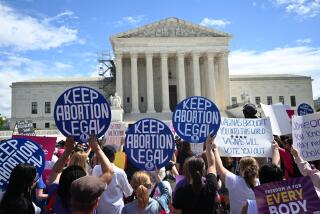A close call for the ‘ministerial exception’
The Supreme Court heard arguments last week in a case that pits religious freedom against freedom from discrimination. It’s a close call, but religious freedom should prevail.
Cheryl Perich was a teacher at a Lutheran school in Michigan who taught secular and religious subjects and led students in prayer. After a leave for treatment of what was diagnosed as narcolepsy, she was pressed by the school to resign. She returned to the school anyway to find her position occupied by another teacher. Faced with dismissal, she threatened to sue the school. She was then fired.
Had Perich worked for a secular organization, there would be no doubt that she could sue her employer for discrimination and retaliation under the Americans with Disabilities Act. But the school argued that it was immune to such suits because of a “ministerial exception” in the law that allows religious organizations to hire only those who share its beliefs. The school maintained that Perich was fired not because of her illness but for violating a Lutheran religious teaching — that Christians shouldn’t sue other Christians in civil court. The ADA allows religious groups to “require that all applicants and employees conform to the religious tenets of such organization.”
The easy part of this case is the general principle: The ministerial exception is well grounded in the religious clauses of the 1st Amendment. As the school’s lawyer put it in his argument, “The churches do not set the criteria for selecting or removing the officers of government, and government does not set the criteria for selecting and removing officers of the church.” Otherwise a Roman Catholic woman could sue her church under civil rights laws for refusing to ordain her as a priest, an action that would put the government in the position of changing the church’s theology.
What makes this case difficult is that Perich was not an ordained minister but a “called “ teacher who taught secular subjects. On the other hand, by virtue of being a called teacher — one who has completed religion courses — she was also a “commissioned minister.” On balance, she ought to be covered by the ministerial exception, though a lay teacher would not be. That is how the court should rule.
Obviously it is impossible to prevent government from making some judgments about religion. It has to determine, for example, whether it is dealing with a religious or a secular institution. Sometimes it must also, as in this case, reach a conclusion about whether someone is or is not a minister. But those unavoidable judgments are different from second-guessing church dogma or interfering with personnel decisions.
The challenge for the court in this case is to preserve the ministerial exception without expanding it so much that anyone who works for a church or religious organization is barred from filing a discrimination complaint. But in this case the government should leave the church alone.
More to Read
A cure for the common opinion
Get thought-provoking perspectives with our weekly newsletter.
You may occasionally receive promotional content from the Los Angeles Times.






